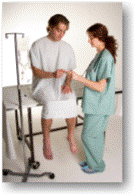Before Surgery
If you are feeling sick before your surgery, please call your surgeon, orthopaedic clinic, operating room booking, or the number you were given.
Do not eat or drink after midnight on the day of your surgery unless you are told otherwise. When you arrive, check in at the Admitting desk. You will need to bring all medications you are on, including herbal supplements, with you to the hospital.
 The hospital where you are having your surgery may require you to bring equipment to the hospital when you go in for surgery, or may ask that someone bring it to you before you are discharged. Ask your friend or family member to bring any equipment you require, clearly labeled, to your hospital unit.
The hospital where you are having your surgery may require you to bring equipment to the hospital when you go in for surgery, or may ask that someone bring it to you before you are discharged. Ask your friend or family member to bring any equipment you require, clearly labeled, to your hospital unit.
To get ready for surgery, you will need to change into a hospital gown. A nurse will start an intravenous (IV) line in your arm, or else the anesthetist will start one in the Operating Room.
During Surgery
You will be given a spinal or general anesthetic. Anesthetics are simply pain medications that help make you more comfortable during your surgery.
If you are having a spinal anesthetic for your joint replacement surgery, it will involve a freezing similar to what you get at the dentist. You will feel numb from the chest down to stop you from feeling any pain. You will not be able to move your legs for up to 4 hours after surgery.
If you are receiving a general anesthetic you will be given a combination of drugs to make you unconscious during the surgery.
Your anesthesiologist will give you medicine through your IV to make you relaxed and sleepy. Any questions you have about your anesthesia you should ask the anesthetist during your Pre-Admission Clinic appointment.
After Surgery
After your surgery in the Operating Room, you will be moved to the Recovery Room for a short while - usually 1 to 3 hours. You may be given oxygen. The nurse will monitor your vital signs frequently, including your pulse and blood pressure. Be sure to tell your nurse if you are in pain! You may be given pain medication regularly through your IV line as needed.
Once you are medically stable, you will be moved to a hospital room in the Orthopaedic/Surgery Unit. After surgery, you will be told how much weight you can place on your new joint. This is called your weight bearing status. The staff will help you stand and walk on your new joint as your doctor allows. As with any surgery you should expect some swelling around the operated area. Your nurse will continue to monitor you to control your pain and that your amount of swelling is normal. You may use a commode/raised toilet seat. The staff will help you walk to the bathroom whenever you are able.
If you are having trouble urinating, you may need a catheter tube temporarily placed in your bladder. If you are having knee surgery (and for some hip surgeries), you may have a drain to help remove any extra fluid.
 To prevent complications after surgery, you will be taught deep breathing and coughing exercises that keep your lungs clear. You will also learn how to do ankle-pumping exercises to improve the blood flow in your legs. Getting up and moving around early after surgery will also help to reduce complications and keep your lungs clear.
To prevent complications after surgery, you will be taught deep breathing and coughing exercises that keep your lungs clear. You will also learn how to do ankle-pumping exercises to improve the blood flow in your legs. Getting up and moving around early after surgery will also help to reduce complications and keep your lungs clear.
You may be given blood thinning medicine to reduce the risk of blood clots. It will be given by injection or in a pill form. To learn more about injections and how to give them by yourself and to find out more about medications and controlling your pain after your surgery visit Pain control and blood clots.